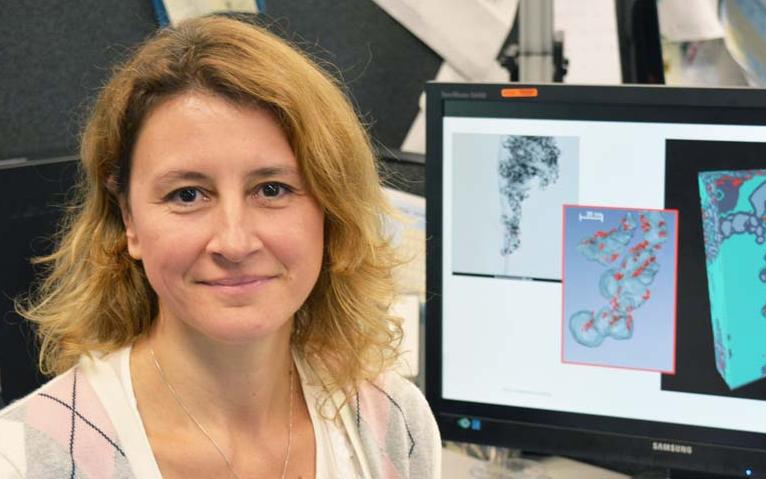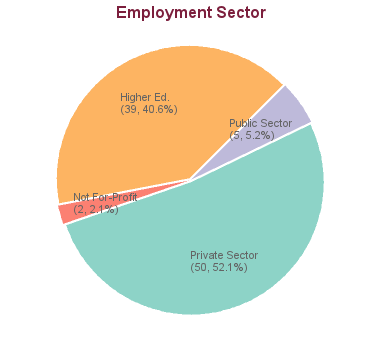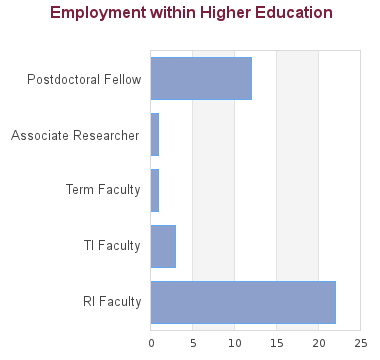
Jasna Jankovic
Job Title
Assistant Professor
Employer
University of Connecticut

Review details about the recently announced changes to study and work permits that apply to master’s and doctoral degree students. Read more
Chemical and Chemical & Biological engineers create and develop processes to change raw materials into the products that society depends on; food, chemicals, fuels, energy, metals, pharmaceuticals, paper, plastics, and personal care products. Chemical and process engineers help to manage natural resources, protect the environment, control health and safety procedures, and recycle materials, while developing and managing the processes which make the products we use.
The Department of Chemical and Biological Engineering was established in 1999 at UBC, and reflects the growing need for engineers in the fields of biotechnology, biomedical and bio-resource engineering. At present there are 24 full-time faculty in the Department of Chemical and Biological Engineering, together with a support staff of 17.
We have established a world-class reputation in several areas of chemical engineering science including fluid-solids contacting, pulp and paper engineering, heat exchanger fouling and, more recently, biotechnology.
The Department is actively engaged in applied research, CHBE faculty-led research provides innovative and sustainable solutions to pressing local and global challenges to industry and society.
Solutions to the above challenges are inextricably linked to our understanding of complex chemical and biological systems.
The Faculty of Graduate and Postdoctoral Studies establishes the minimum admission requirements common to all applicants, usually a minimum overall average in the B+ range (76% at UBC). The graduate program that you are applying to may have additional requirements. Please review the specific requirements for applicants with credentials from institutions in:
Each program may set higher academic minimum requirements. Please review the program website carefully to understand the program requirements. Meeting the minimum requirements does not guarantee admission as it is a competitive process.
Applicants from a university outside Canada in which English is not the primary language of instruction must provide results of an English language proficiency examination as part of their application. Tests must have been taken within the last 24 months at the time of submission of your application.
Minimum requirements for the two most common English language proficiency tests to apply to this program are listed below:
Overall score requirement: 90
Reading
22
Writing
21
Speaking
21
Listening
22
Overall score requirement: 6.5
Reading
6.0
Writing
6.0
Speaking
6.0
Listening
6.0
Some programs require additional test scores such as the Graduate Record Examination (GRE) or the Graduate Management Test (GMAT). The requirements for this program are:
The GRE is not required.
Deadline to submit online application. No changes can be made to the application after submission.
Transcript DeadlineDeadline to upload scans of official transcripts through the applicant portal in support of a submitted application. Information for accessing the applicant portal will be provided after submitting an online application for admission.
Referee DeadlineDeadline for the referees identified in the application for admission to submit references. See Letters of Reference for more information.
All applicants have to submit transcripts from all past post-secondary study. Document submission requirements depend on whether your institution of study is within Canada or outside of Canada.
A minimum of two references are required for application to graduate programs at UBC. Each graduate program determines the type of reference (e.g. academic, professional) and number of references they require which can range from 2 to 4. References should be requested from individuals who are prepared to provide a report on your qualifications for the program.
Many programs require a statement of interest, sometimes called a "statement of intent", "description of research interests" or something similar.
Students in research-based programs usually require a faculty member to function as their thesis supervisor. Please follow the instructions provided by each program whether applicants should contact faculty members.
Permanent Residents of Canada must provide a clear photocopy of both sides of the Permanent Resident card.
All applicants must complete an online application form and pay the application fee to be considered for admission to UBC.
| Fees | Canadian Citizen / Permanent Resident / Refugee / Diplomat | International |
|---|---|---|
| Application Fee | $116.25 | $168.25 |
| Tuition * | ||
| Installments per year | 3 | 3 |
| Tuition per installment | $1,875.34 | $3,294.66 |
| Tuition per year (plus annual increase, usually 2%-5%) | $5,626.02 | $9,883.98 |
| Int. Tuition Award (ITA) per year (if eligible) | $3,200.00 (-) | |
| Other Fees and Costs | ||
| Student Fees (yearly) | $1,144.10 (approx.) | |
| Costs of living | Estimate your costs of living with our interactive tool in order to start developing a financial plan for your graduate studies. | |
Applicants to UBC have access to a variety of funding options, including merit-based (i.e. based on your academic performance) and need-based (i.e. based on your financial situation) opportunities.
From September 2024 all full-time students in UBC-Vancouver PhD programs will be provided with a funding package of at least $24,000 for each of the first four years of their PhD. The funding package may consist of any combination of internal or external awards, teaching-related work, research assistantships, and graduate academic assistantships. Please note that many graduate programs provide funding packages that are substantially greater than $24,000 per year. Please check with your prospective graduate program for specific details of the funding provided to its PhD students.
This results in a net balance (any funding provided to the student minus tuition and fees) mean of $32,515 and median of $31,472.
All applicants are encouraged to review the awards listing to identify potential opportunities to fund their graduate education. The database lists merit-based scholarships and awards and allows for filtering by various criteria, such as domestic vs. international or degree level.
Many professors are able to provide Research Assistantships (GRA) from their research grants to support full-time graduate students studying under their supervision. The duties constitute part of the student's graduate degree requirements. A Graduate Research Assistantship is considered a form of fellowship for a period of graduate study and is therefore not covered by a collective agreement. Stipends vary widely, and are dependent on the field of study and the type of research grant from which the assistantship is being funded.
Graduate programs may have Teaching Assistantships available for registered full-time graduate students. Full teaching assistantships involve 12 hours work per week in preparation, lecturing, or laboratory instruction although many graduate programs offer partial TA appointments at less than 12 hours per week. Teaching assistantship rates are set by collective bargaining between the University and the Teaching Assistants' Union.
Academic Assistantships are employment opportunities to perform work that is relevant to the university or to an individual faculty member, but not to support the student’s graduate research and thesis. Wages are considered regular earnings and when paid monthly, include vacation pay.
Canadian and US applicants may qualify for governmental loans to finance their studies. Please review eligibility and types of loans.
All students may be able to access private sector or bank loans.
Many foreign governments provide support to their citizens in pursuing education abroad. International applicants should check the various governmental resources in their home country, such as the Department of Education, for available scholarships.
The possibility to pursue work to supplement income may depend on the demands the program has on students. It should be carefully weighed if work leads to prolonged program durations or whether work placements can be meaningfully embedded into a program.
International students enrolled as full-time students with a valid study permit can work on campus for unlimited hours and work off-campus for no more than 24 hours a week during academic sessions.
A good starting point to explore student jobs is the UBC Work Learn program or a Co-Op placement.
Students with taxable income in Canada may be able to claim federal or provincial tax credits.
Canadian residents with RRSP accounts may be able to use the Lifelong Learning Plan (LLP) which allows students to withdraw amounts from their registered retirement savings plan (RRSPs) to finance full-time training or education for themselves or their partner.
Please review Filing taxes in Canada on the student services website for more information.
Applicants have access to the cost estimator to develop a financial plan that takes into account various income sources and expenses.
106 students graduated between 2005 and 2013: 1 graduate is seeking employment; 1 is in a non-salaried situation; for 8 we have no data (based on research conducted between Feb-May 2016). For the remaining 96 graduates:


These statistics show data for the Doctor of Philosophy in Chemical and Biological Engineering (PhD). Data are separated for each degree program combination. You may view data for other degree options in the respective program profile.
| 2023 | 2022 | 2021 | 2020 | 2019 | |
|---|---|---|---|---|---|
| Applications | 82 | 94 | 99 | 116 | 84 |
| Offers | 18 | 14 | 15 | 30 | 12 |
| New Enrolment | 10 | 12 | 12 | 27 | 10 |
| Total Enrolment | 82 | 82 | 83 | 67 | 70 |
Students in research-based programs usually require a faculty member to function as their thesis supervisor. Please follow the instructions provided by each program whether applicants should contact faculty members.
These videos contain some general advice from faculty across UBC on finding and reaching out to a supervisor. They are not program specific.
This list shows faculty members with full supervisory privileges who are affiliated with this program. It is not a comprehensive list of all potential supervisors as faculty from other programs or faculty members without full supervisory privileges can request approvals to supervise graduate students in this program.
| Year | Citation |
|---|---|
| 2025 | Dr. Fleetwood researched biobased, responsive membranes and hydrophobic coatings for waterproof, breathable materials (i.e. rain jackets). Through this work, she developed a plant-based, aqueous, water-repellent spray and a guard cell isolation protocol. |
| 2025 | Dr. Wang focuses on standardizing the procedure for creating digital replicas of real-world systems, particularly in industrial manufacturing. Her work spans from initial modeling to model updating and enabling interactions between the digital replica and the physical system. This research will enhance manufacturing efficiency and productivity. |
| 2025 | Dr. Bashir developed clean energy processes for green alkaline peroxide production and carbon dioxide utilization by addressing electrode stability and scale-up challenges associated with two phase electrochemical processes. |
| 2025 | Dr. Jbara's worked on modeling systems of particles and fluids. Using computational methods and machine learning, she developed advanced models that enhance the accuracy of predicting particle-fluid dynamics. Her work pushes the boundaries of traditional simulations, offering solutions with profound implications for engineering and industry. |
| 2025 | Dr. Shirvani investigated the use of two-dimensional nano-catalysts for chemical reactions relevant to clean energy. Her work demonstrated that these materials improved catalyst performance in hydrogen storage and transportation and greenhouse gas mitigation technologies — offering efficient solutions for clean energy and environmental protection. |
| 2024 | Dr. Niu studied the fundamental mechanisms of self-assembly of betulin, a birch bark extract, along with its interfacial behavior and the structure-property correlations that are expected to enable new material designs suitable for various applications and signify a contribution to advanced green platforms for the bark-based circular bioeconomy. |
| 2024 | Dr. Sharma’s research focused on bio-electrochemical fuel cells and their application in remediating hazardous acid rock waste. He explored scaling up this technology to recover critical metals from the waste, contributing to the idea of a circular economy. His work is significant in accelerating deployment of this technology in mining operations. |
| 2024 | Dr. Kritharis developed a novel cell-free protein synthesis system (CFPS) for the production of vaccines. He demonstrated that life-saving components can be produced with CFPS. In addition, he significantly reduced the cost of CFPS paving the way for cheaper vaccines with greater access for the developing world. |
| 2024 | Dr. Daemi applied Gaussian Processes and Probabilistic Principal Component Analysis in transfer learning. She introduced three novel methods for extracting domain invariant features. These methods have been validated through multiple case studies, demonstrating their efficacy in real-world process monitoring and soft sensor design. |
| 2024 | Dr. Jameson’s research focused on electrochemical energy storage and generation. He developed, constructed, and tested high-performance rechargeable iodine-based redox flow batteries. His research contributes to global energy management and furthering the viability of renewable energy. |
Chemical and Biological Engineering provides innovative and sustainable solutions to pressing local and global challenges to industry and society, with faculty being engaged in the following broad areas:
Departments/Programs may update graduate degree program details through the Faculty & Staff portal. To update contact details for application inquiries, please use this form.

This city won’t disappoint. It has it all: sea, parks, mountains, beaches and all four seasons, including beautiful summers and mild, wet winters with snow.